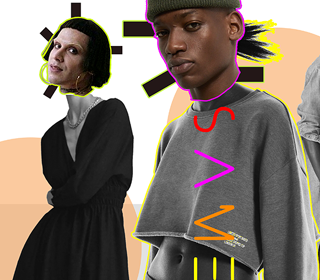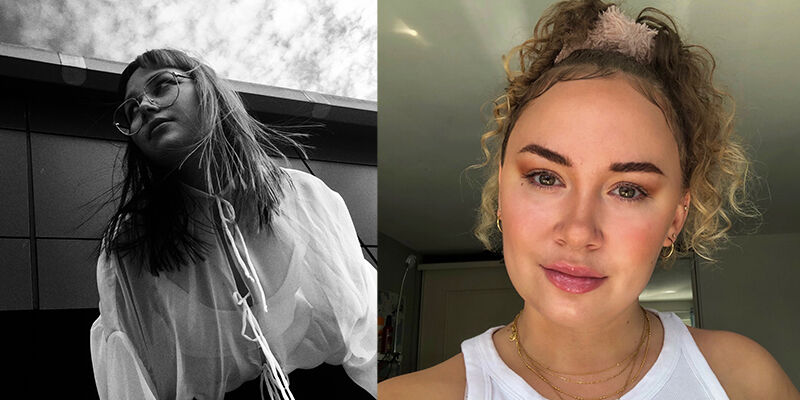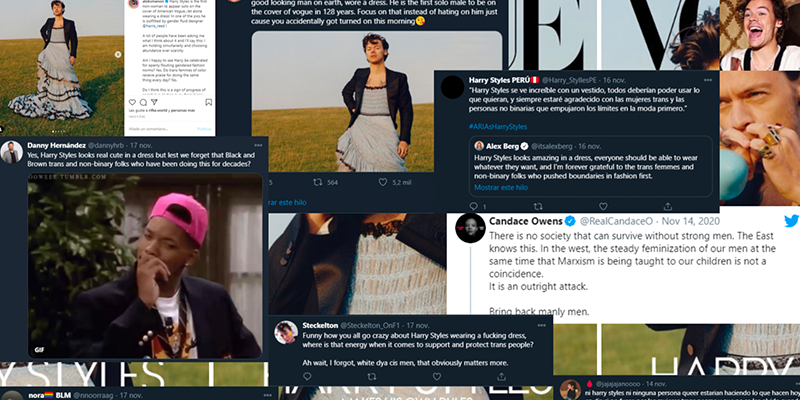
Blog

Two final year students on BA (Hons) Fashion Design course recently took part in MODA-FAD’s annual Sustainable Challenge. The initiative, a collaboration with Design Manchester and the British Council, saw 20 UK students and 20 Spanish students participate in group tasks and talks.
Students from all UK fashion schools applied, making online submissions to present themselves and outline their aspirations for the project, and Bethany Fellows and Andrea Kiss were selected from Birmingham City University.
Forming part of both Design Manchester DM20 and Barcelona Design Week, the online workshop was curated by Lucy Bonner and Roberto Piqueras who challenged the students to develop projects around the topic of Gender Perspectives in Fashion. Participants were asked to consider whether we can leave behind the labels of ‘male’ and ‘female’ fashion and build a more inclusive model.
We caught up with Bethany and Andrea to find out more…

Andrea (left) and Bethany (right)
Firstly, how did it feel to be selected for the project?
Andrea: I was very happy because initially I wasn’t selected so it was great news when I later received an acceptance email.
Bethany: It was bit of a shock as I know so many students would have put themselves forward for this, so I was very excited to be taking part!
Can you tell us more about your experience in the workshop and what you hoped to gain from it?
Andrea: We were split into groups of five with a mix of UK and Spanish students, and there were several topics we could choose to focus on: design, pattern-cutting, marketing, branding, photography, etc. My team chose branding so we discussed our ideas and decided on concepts then one person worked on web layouts, another person mock-ups and so on, and I made a billboard campaign.
Bethany: We were invited to watch a few talks with a number of experts from different backgrounds, some Spanish and some British, where they discussed different views and stories behind how gender affected fashion. We then discussed these talks in our groups which were a mixture of English and Spanish university students and it was interesting to see how we were able to discuss such complex matters despite not speaking the same language. I hoped that by taking part, I’d learn more about gender perspectives in fashion and that I would be able to address those complexities in my work.
Andrea: I was interested to hear other people’s stories and how they tackle gender issues in their work. As there were several LGBTQ+ participants in the project, it was really valuable to hear first-hand opinions and perspectives which helped me broaden my view on gender, clothing and on the gender sustainability issue in general.

What are the key things you learnt from the Sustainable Challenge?
Andrea: I’ve learnt more teamwork skills, how to get to know people’s strengths quickly and accommodate everyone’s opinions as well finding the best option for the project.
Bethany: I think this project taught me to approach clothing as a way of expression and comfort and that there are not simply two binary boxes that a garment can fall into. I think this will encourage me to explore more shapes and techniques in my future designs.
What are your future plans now you’re in the final year of your degree?
Bethany: As I completed a sandwich year prior to my final year, I’m hoping that I have enough experience to go straight into work. I’d like to work for a smaller brand with a distinctive personality and room for creativity, possibly one that is trying to become more sustainable. I hope to be able to bring my knowledge of gender and sustainability forward into whatever role I take on.
Andrea: I plan to apply for a master’s degree specialising in menswear as I want to develop my tailoring and patternmaking skills. I also feel that taking a sandwich year helped me gain a better understanding of the industry and made me realise that I would really benefit from continuing my studies.
What’s the best thing about studying at Birmingham City University and what would your advice be to prospective students?
Andrea: The tutors. They’re always ready to help and to provide me with the best advice and point me towards the right path. They have been a great support.
Bethany: I agree, the tutors are amazing and they help shape you into becoming a more confident designer as well as pushing you to further yourself at every move. The course offers so many contacts and external opportunities that are well worth putting yourself forward for. I wish I had taken some of them up sooner as I think they would have really helped me grow in confidence.
Also, I looked at many universities before deciding on Birmingham City University and one of the deciding factors was the facilities that are available here. They’re so modern and advanced and there’s every piece of equipment you could possibly think of.
Andrea: There are lots of great facilities and workshops that can help you develop projects and skillsets. If you put in the time and effort, the possibilities are endless!




